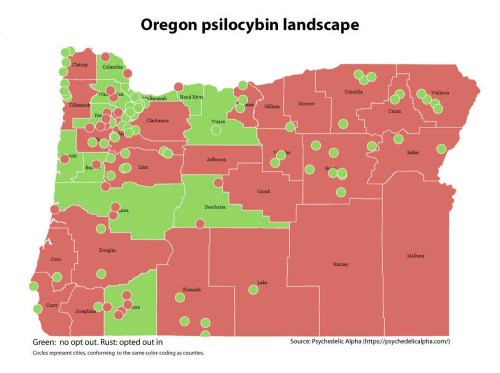Election 2022: 137 Oregon towns and counties vote to opt out of psilocybin services
Published 9:21 am Friday, November 11, 2022

- The map shows the locations in Oregon that have opted out of psilocybin services. A list of locations by county can be found at psychedelicalpha.com.
SALEM — The divide between urban and rural Oregonians was apparent Tuesday, when 27 of Oregon’s 36 counties, as well as 114 towns, voted on whether or not they would allow the state’s legal psilocybin program to operate within their borders.
A map from Psychedelic Alpha shows where opt-outs passed. While it shows nearly two-thirds of the state will not allow psilocybin centers and manufacturing, the places where the majority of Oregon’s population live, the Portland metro area and the majority of the Willamette Valley, will allow psilocybin.
Trending
The opt-out measures were so widespread that Leslie Carlson, a spokesperson for Healing Advocacy Fund, an advocacy group for legal psilocybin, said that organization wasn’t even aware of nine of the city opt-out measures until results for those measures appeared on the Secretary of State’s website.
The original measure to allow psychedelic mushroom treatment centers in the state, Measure 109, passed in 2020 with 56% of the vote, which means 1,270,057 people voted for it. But the vote tallies this year for jurisdictions to opt out of psilocybin centers and manufacturing in small towns and cities were much, much smaller.
In Douglas County, the opt-out measure in the town of Drain is currently passing with 67% or about 100 votes. In Elkton, an opt-out is passing with 74% and 53 votes.
Only one town with a measure on the ballot — Phoenix — did not pass an opt-out.
Within Deschutes County, La Pine voted to opt out. Redmond voted to prohibit the manufacturing of psilocybin products and enact a two-year moratorium on psilocybin service centers.
At the county level, only three of the countywide bans failed — those in Deschutes, Jackson and Josephine counties.
Trending
In 24 other counties, the bans passed.
What that means is that in unincorporated parts of those 24 counties, psilocybin centers and manufacture will not be legal. Incorporated areas of those counties are automatically opted in to allowing the program unless they also voted to opt out.
Of all 137 opt-outs that passed, 17 are temporary and will only last two years. Any of the other bans could be repealed by voters.
According to Healing Advocacy Fund, in the aftermath of Tuesday’s vote, a remaining 127 Oregon cities and 12 counties will have the option of allowing psilocybin service centers and manufacturing.
The new Oregon law goes into effect in January, though Oregonians won’t be able to access legal psilocybin for several months. First, facilitators must be trained, centers created and psilocybin grown.
Unlike with legal cannabis, all psilocybin will be consumed onsite and under supervision.
Sam Chapman, executive director of the Healing Advocacy Fund, thinks the newness of the program is what led people to vote to opt out in some communities.
“What we saw in this election is that when voters hear from their local community members about the potential of psilocybin therapy for addressing conditions like anxiety, depression and addiction, they are more likely to support it,” Chapman said. “We think that as the therapy gets implemented in Oregon communities in 2023 and beyond, voters will continue to learn about how it can help address our mental health crisis, and over time access will only continue to expand.”
For Mike Arnold, a lawyer who once represented Ammon Bundy, who hopes to create a psilocybin service center in Jackson County, the choice to limit access to psilocybin in rural parts of the state is a mistake.
“Rural Oregonians deserve access,” Arnold said. “A high percentage of combat veterans live in rural areas, and I have a hard time telling them that they have to travel far from their support networks to get access.”
Arnold said he saw many people in Harney County, which voted to opt out in both incorporated parts of the county and in Hines and Burns, with trauma in the wake of the Malheur occupation.
“The defendants, their families, the refuge employees, the surrounding community, the young woman in the truck that was shot at by the state police at the roadblock, etc.,” he said. “It’s a shame that the stigma is still alive with psychedelic therapy.”
But, Arnold noted, public opinion is shifting. Even as parts of Oregon limited access to psilocybin, the state of Colorado passed its own law Tuesday, legalizing psilocybin therapy state-wide.









